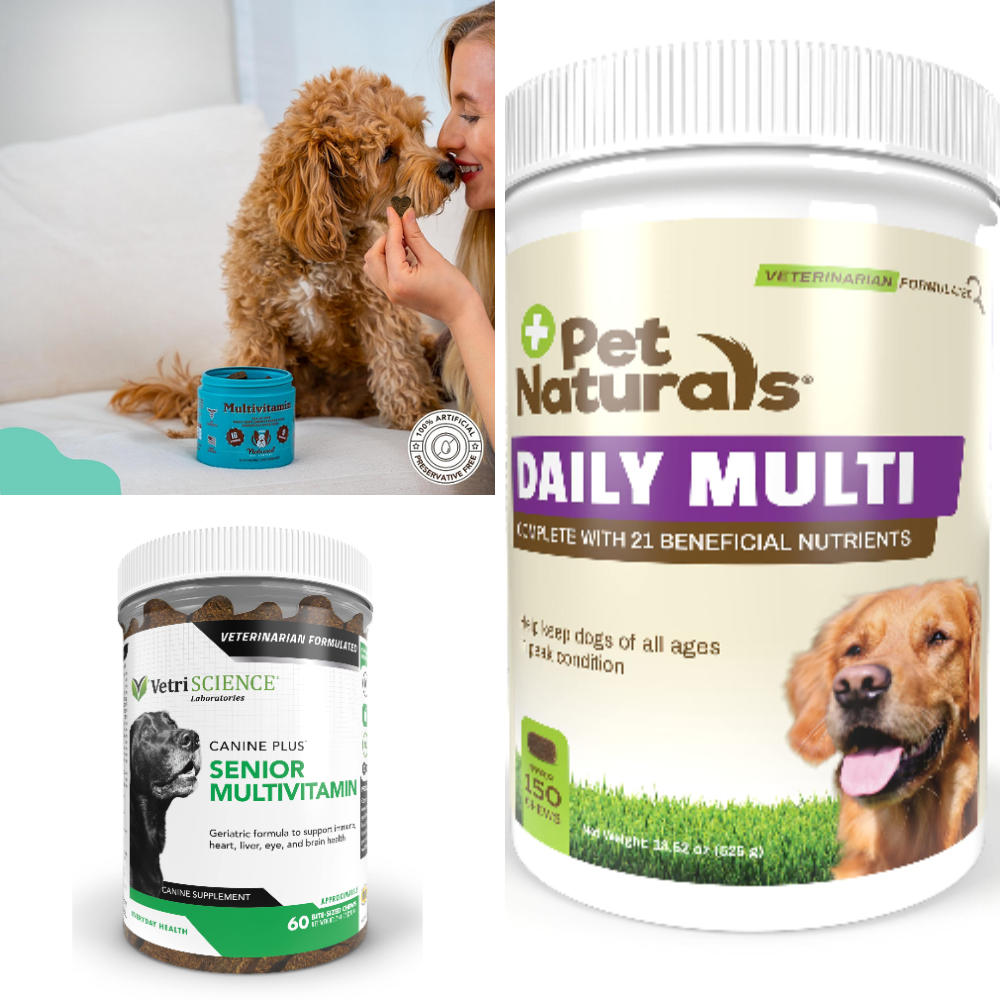As pet parents, we often wonder, "Does my dog need vitamins?" While there's no one-size-fits-all answer, the consensus among veterinary nutritionists is that it depends on your dog's diet and overall health. This comprehensive guide will delve into the importance of vitamins in a dog's diet, the essential nutrients for a dog's health, and how to incorporate these into your dog's food.
The Role of Vitamins and Minerals in a Dog's Diet
Vitamins and minerals are vital components of any dog's diet. They play a critical role in maintaining your dog's health, from ensuring healthy bone growth to supporting the immune system. For instance, Vitamin D, also known as the "sunshine vitamin," helps balance minerals like phosphorous and calcium for healthy bone growth.
But what about human vitamins? Can they be given to dogs? Not necessarily. Human vitamins may contain ingredients that are harmful to dogs or dosages that are too high. It's always best to stick with specially formulated dog vitamins or dog supplements that meet the nutritional needs of your furry friend.
How Vitamins and Minerals Benefit a Dog's Body
As pet parents, we all want our furry friends to be healthy and happy. And the key to achieving that is to ensure that they receive a well-balanced and nutritious diet. By including essential vitamins and minerals in your dog's diet, you can ensure that they stay healthy and live a long life.
Strong Bones and Teeth
Just like humans, dogs also need calcium and other essential minerals to keep their bones and teeth healthy. Calcium helps build strong bones and teeth, while phosphorus and magnesium play a vital role in their maintenance. These minerals help strengthen the teeth and prevent them from breaking. Feeding your dog foods rich in these minerals such as dairy products, fish, and meat can help them maintain strong bones and healthy teeth.
Strong Immune System
Vitamins C and E, along with several minerals, including zinc, iron, and selenium, help support a strong immune system in dogs. A strong immune system helps fight off infections, viruses, and other diseases. Foods rich in vitamin C include apples, bananas, and citrus fruits, while vitamin E can be found in sunflower oil and nuts. Zinc is found in chicken, beef, and fish, while iron can be found in red meat and spinach. Feeding your dog a diet rich in these vitamins and minerals can help maintain a strong immune system.
Healthy Skin and Coat
Proper nutrition is essential for maintaining healthy skin and coat in dogs. Vitamins A, E, and C, along with several minerals such as zinc, copper, and iron, play a significant role in this regard. These vitamins and minerals help regulate the production of sebum, which keeps the skin and coat moisturized. Foods rich in these vitamins and minerals include carrots, sweet potatoes, spinach, and fish. By feeding your dog these foods, you can help them maintain a healthy coat and skin.
Better Digestion
Dogs require a balanced diet that includes the proper amount of fiber to maintain healthy digestion. Fibers help promote regular bowel movements, prevent constipation, and promote the growth of beneficial bacteria in the gut. Foods such as berries, apples, pumpkin, and oatmeal are rich in fiber and can be an excellent addition to your dog's diet. Including these foods in your dog's diet can help improve their digestive health.
Better Overall Health
Vitamins and minerals are essential for the overall health and well-being of dogs. They play a vital role in the body's natural processes and functions. By ensuring that your furry friend receives a diet rich in essential vitamins and minerals, you can help promote their overall health and wellness. A well-nourished dog is less likely to suffer from diseases and illnesses and will have a better quality of life.
The Importance of a Balanced Diet for Dogs
A well-balanced diet is crucial for maintaining your pet's health. Most commercial dog foods are formulated to meet these nutritional requirements. However, dogs on a homemade diet or those with certain health conditions may require vitamin supplements.
Dog vitamin supplements can come in various forms, such as soft chews or liquids, and can be mixed into your dog's food for easy consumption. Joint supplements, for example, are often recommended for aging dogs to support joint health.
Incorporating Vitamins into Your Dog's Diet
A complete and balanced diet is the best way to provide your dog with the essential nutrients it needs. Most commercial dog foods are formulated to meet these nutritional requirements. However, dogs on a homemade diet or those with certain health issues may require vitamin supplements.
Dog vitamin supplements can come in various forms, such as soft chews or liquids, and can be mixed into your dog's food for easy consumption. Joint supplements, for example, are often recommended for aging dogs to support joint health.
When to Consider Dog Supplements
As a dog parent, it is normal to pay attention to your furry friend’s health and well-being. You feed them with a diet that meets their nutritional needs, take them to the vet for check-ups, and give them plenty of exercise to maintain their health. However, as your dog ages or faces certain health conditions, their nutritional needs can change, and their diet alone may not be sufficient to support their overall health. That’s when dog supplements come into the picture. In this section, we will discuss when you should consider giving your dog supplements and how they can benefit their health.
Age-related health problems
Just like humans, dogs tend to develop health problems as they age. These can include arthritis, diabetes, heart disease, and kidney problems, among others. If your dog has any of these age-related health conditions, they may benefit from supplements. Joint supplements, for example, can help with arthritis and joint pain, while omega-3 fatty acids can support heart health.
Poor appetite or picky eating
If your dog is not eating enough or is a picky eater, they may not be getting all the nutrients they need from their diet. In such cases, supplements can be added to ensure your dog is meeting their daily nutritional needs. Multivitamins and probiotics are common supplements used to address these problems in dogs.
Specific health conditions
Certain health conditions can benefit from targeted nutritional supplements. For example, if your dog has a skin condition, omega-3 and omega-6 fatty acids can help improve their coat’s appearance and alleviate itching. Similarly, digestive issues and frequent loose stool can be addressed with prebiotics and probiotics supplements.
Exercise and athletic performance
If your dog is highly active or an athlete, supplements can help them optimize their performance and promote faster recovery after exertion. For instance, supplements containing glucosamine and chondroitin can support joint health and prevent injuries, while protein supplements can support muscle building and recovery.
Environmental factors
Lastly, environmental factors can also play a role in your dog's need for supplements. For example, if you live in a region with low sunlight exposure, your dog may require a vitamin D supplement to support healthy bones and teeth. Similarly, if your dog is exposed to toxins or harmful substances, supplements containing antioxidants can help protect their body cells from damage.


The answer to "Does my dog need vitamins?" largely depends on your dog's diet and overall health. Many dogs get the necessary vitamins and minerals from their dog food. However, some dogs, particularly those with certain health conditions or those on a homemade diet, may benefit from vitamin supplements.
As pet owners, our goal is to ensure our furry friends lead a healthy life. By understanding the role of vitamins in a dog's body and consulting with a veterinary nutritionist, we can make informed decisions about our pets' nutritional needs.
In conclusion, while vitamins are certainly important for your dog's health, they should be given in moderation and under the guidance of a professional. After all, the key to a healthy dog isn't just about the right vitamins, but also about a well-balanced diet, regular exercise, and plenty of love.













